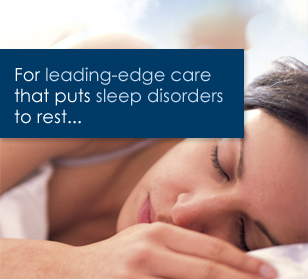 |
|
Comprehensive
Capabilities
 Offering one-stop care for all sleep
disorders. Offering one-stop care for all sleep
disorders.
Today‚€™s technological advances in sleep medicine have
significantly improved the way sleep disorders are diagnosed.
Here at The Sleep Institute, our team stays
on the leading edge of our field. By using the most up-to-date
diagnostic equipment and treatment methods, we can
provide you with an accurate and highly detailed evaluation of
your sleep problem and the care you need to get a good night‚€™s
rest.
This includes, but is not limited to, the
diagnosis and treatment of:
- Sleep apnea - This potentially
life-threatening disorder is linked to irregular heartbeat,
high blood pressure and heart failure. Sleep apnea can cause
you to involuntarily stop breathing for up to one minute
while sleeping. Symptoms include loud snoring, pauses in
breathing and daytime sleepiness. We can usually treat
obstructive sleep apnea (OSA) nonsurgically with a
continuous positive airway pressure (CPAP) device. The CPAP
device, which we custom-fit for the greatest comfort, helps
you breathe easy throughout the entire night.
- Excessive daytime sleepiness
(EDS) - This sleep disorder is characterized
by an inability to stay awake, even in situations when
wakefulness is critically important, such as behind the
wheel of a car. We can address EDS with advanced medications
and lifestyle changes.
- Insomnia - If you have trouble
falling asleep, find it nearly impossible to fall asleep
during the night or wake up too early in the morning, you
might suffer from insomnia. We can determine if your
insomnia is associated with a medical or psychiatric problem
and treat it accordingly.
- Hypersomnias - If you sleep too
much during the night or day, you might suffer from
hypersomnia. Hypersomnia may be caused by another sleep
disorder, dysfunction of the autonomic nervous system or
drug or alcohol abuse.
Symptoms include sleeping in too
late, chronic depression, chronic fatigue, feelings of
jet-lag, circadian rhythm disorders or medical illnesses.
The Sleep Institute can address hypersomnias with advanced
medications and lifestyle changes.
- Delayed sleep phase syndrome
(DSPS) - If you stay up extremely late, for
example until 2 a.m. to 4 a.m., and then sleep all morning
and get up around noon, you may suffer from DSPS. This
condition can cause daytime sleepiness and impaired
performance at work or school. DSPS is very common in
teenagers, young adults and college students.
- Advanced sleep phase syndrome
(ASPS) - This condition is characterized by
falling asleep early, usually between 6 p.m. and 8 p.m., and
waking up before dawn. If you suffer from ASPS, you may fall
asleep at dinner parties and early evening social functions
but may force yourself to stay awake later in the evening.
ASPS affects many adults over the age of 65.
- Restless legs syndrome (RLS) -
This is an uncomfortable disorder that causes cramping,
burning and itching in the legs while resting or sitting for
long periods. RLS can be so distressing it causes you to
lose sleep, resulting in daytime drowsiness and insomnia. If
you suffer from RLS, we may prescribe medication and
recommend stretching to provide temporary relief. While RLS
can affect children and pregnant women, most cases are
diagnosed in people aged 40 and older.
- Periodic limb movements in sleep (PLMS)
- People who suffer from PLMS experience involuntary and
repetitive leg-jerking while sleeping. These movements can
happen throughout the night and be a nuisance to your
spouse. PLMS, like RLS, can cause daytime sleepiness and
insomnia. The Sleep Institute can treat PLMS with advanced
medications and may also recommend specialized therapy
before bedtime.
- Parasomnias - These are abnormal
physical behaviors that occur while you are sleeping. They
include sleepwalking, night-terrors, rhythmic movement
disorder, teeth-grinding, bed-wetting and REM behavior
disorder.
The Sleep Institute can effectively treat
parasomnias with many leading-edge therapies.
- Medical disorders - Some medical
disorders are exacerbated by sleep problems. These include
chronic pain, chronic fatigue syndrome, fibromyalgia,
hypertension, asthma, ADHD, depression, nocturnal
gastroesophageal reflux, dementia and congestive heart
failure.
|
|
|
|
|
Copyright © 2007 The Sleep Institute All
Rights Reserved.
2680 Channing Way, Idaho Falls, ID
83404 | 53 Poplar, Blackfoot, ID 83221 | 155
West Main Street, Rexburg, ID 83440 | |
|